Roger D. Markwick*
‘The “sacralisation” of history and state legitimation’, Honest History, 2 May 2017
This is a slightly edited version of a paper presented to a conference, History and Authority: Political Vocabularies of the Modern Age, Humanities Research Centre, Australian National University, Canberra, 28-29 July 2016.
ABSTRACT
Historiography is inherently political. History and historians can play a part in either legitimating the status quo or de-legitimating it. Clearly, arguments about the past have vital implications for our understanding of the present. In modern nation states, the dominant patriotic narratives that valorise national identity, often as not born of war, mask dark deeds, past and present. For that reason, even in the most seemingly liberal of modern nation states, authorities almost universally seek to sacralise national history to the degree where to challenge it not only meets the ire of conservative politicians and public opinion but it becomes taboo or even blasphemous to do so: historical revisionism becomes fraught.
This paper compares three instances of such ‘sacralisation’: Australia and Anzac; Russia and the Great Patriotic War; and Israel and the Holocaust. To one degree or another, in all three nation states, despite their seeming dissimilarities, the state has actively promoted the sacralisation of a national master narrative; to challenge it is sacrilege.
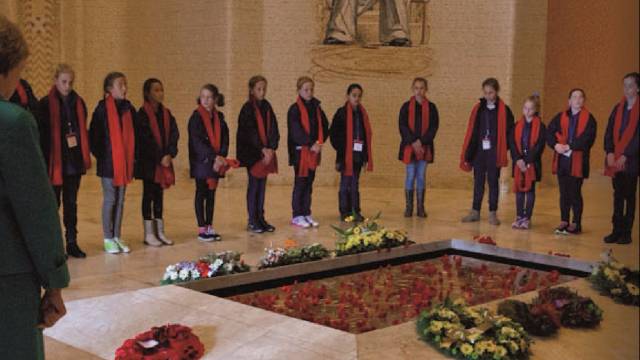 Tomb of the Unknown Australian Soldier, Australian War Memorial, Canberra (Visit Canberra)
Tomb of the Unknown Australian Soldier, Australian War Memorial, Canberra (Visit Canberra)
In Australia, in the lead up to the centenary of the Allied attack on Turkey, the once languishing Anzac tradition has been virtually elevated to a secular religion, with Gallipoli as its ‘sacred site’. In post-Soviet Russia, victory over fascism in ‘The Great Patriotic War, 1941-1945’, largely shorn of its Soviet iconography, has been resurrected as a ‘sacred cause’ brooking no criticism and bolstering Russian state authority and authoritarianism. In Israel, the Jewish state has increasingly invoked ‘The Holocaust’, the most morally powerful trope of modern times, not only to legitimate the establishment of the state but also to deter criticism of its mistreatment of the Palestinians.
This paper is a comparative consideration of the ‘mythologisation’ of the past as state legitimation; national mythologisations that have their own history and set the boundaries of acceptable historical discourse and thereby constrain historical and contemporary enquiry.
___________________________
On the centenary of the Anzac landings at Gallipoli, Ottoman Turkey, 25 April 2015, the failed invasion was hailed by the Australian Government as the foundation of a ‘tradition – the ideals of courage, endurance and mateship’ and a ‘legend’: the ‘Anzac spirit’.[1] That same day an SBS sports journalist, Scott McIntyre, tweeted:
Remembering the summary execution, widespread rape and theft committed by these “brave” Anzacs in Egypt, Palestine and Japan. … The cultification of an imperialist invasion of a foreign nation that Australia had no quarrel with is against all ideals of modern society.
A swift response came from then Communications Minister and prime minister-in-waiting Malcolm Turnbull: ‘Difficult to think of more offensive or inappropriate comments … Despicable remarks which deserve to be condemned.’ The very next day McIntyre was dismissed by SBS for ‘inappropriate and disrespectful’ comments.[2]
McIntyre was obviously punished for transgressing what has become a ‘sacred day’ in Australia’s national calendar. But Anzac Day was not ever thus. In the 1960s and 1970s the Anzac ‘tradition’ languished. However, through a concerted government campaign, ‘the spirit of Anzac’ has now been virtually elevated to a secular religion with Gallipoli as its ‘sacred site’.
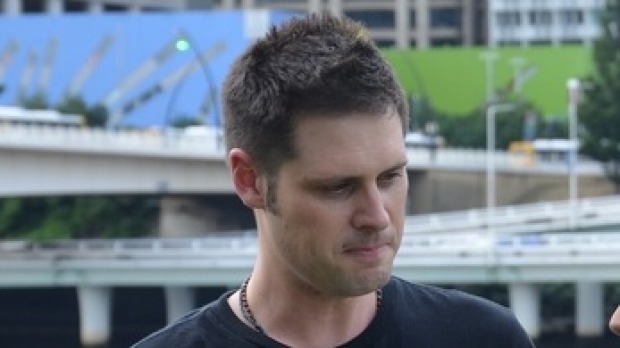 Scott McIntyre (Stuff.co.NZ)
Scott McIntyre (Stuff.co.NZ)
Australia is not alone in ‘sacralising’ its history. In post-Soviet Russia, victory over fascism in ‘The Great Patriotic War, 1941-1945’, largely shorn of its Soviet iconography, has been resurrected as a ‘sacred cause’ brooking no criticism and bolstering Russian state authority and authoritarianism. In Israel, the Jewish state has increasingly invoked ‘The Holocaust’, the most morally powerful trope of modern times, not only to legitimate the establishment of the state but also to deter criticism of its relentless dispossession of the Palestinian people.
Historiography is inherently political, I contend. History and historians can play a part in either legitimating the status quo or de-legitimating it. Clearly, arguments about the past have vital implications for our understanding of the present. In modern nation states, the dominant patriotic narratives that valorise national identity, often as not born of war, can mask dark deeds, past and present. For that reason, even in the most seemingly liberal of these states, authorities almost universally seek to sacralise national history. This paper is a comparative consideration of the ‘mythologisation’ of the past as state legitimation; national mythologisations that have their own history and set the boundaries of acceptable historical discourse and thereby constrain historical and contemporary enquiry.
Australia: Anzac
‘The relentless militarisation of Australian history’ is the thesis of a 2010 book of essays provocatively titled ‘What’s Wrong with Anzac?’, authored by some of Australia’s leading historians.[3] ‘The Anzac revolution’ of the early 21st century, as Mark McKenna calls it, has transformed ‘the Anzac legend’ into the ‘most powerful myth of nationhood’. McKenna accepts in part a number of the explanations first advanced by historian Ken Inglis, celebrated author of Sacred Places: War Memorials in the Australian Landscape (first published 1998), to explain the Anzac ‘resurgence’ in the late 1980s and early 1990s, above all the ‘urgent need for a “civil religion” in a “post-Christian society”’.[4] But, for McKenna, such an explanation needs to be located in Australia’s 1980s ‘politics of nationalism’, particularly the 1988 bicentenary of British settlement. Not only did the bicentennial fail to inspire mass patriotic sentiment, it also opened up the thorny question of British ‘invasion’ and its catastrophic consequences for Indigenous Australians, captured in the protest slogan, ‘White Australia has a Black History’.
 The Prince of Wales and Prime Minister Howard, Gallipoli, 2005 (NewsCorp)
The Prince of Wales and Prime Minister Howard, Gallipoli, 2005 (NewsCorp)
This slogan was virtually the opening shot in the two decades long ‘History Wars’, centred on frontier settler violence, waged notably by Tasmanian historian Henry Reynolds, but dismissed by Liberal prime minister John Howard (1996-2007) as ‘Black armband’ history. Howard found in the martial ‘spirit of Anzac’ the perfect foil to what he perceived as divisive, unpatriotic denials of the achievements of White Australia. Howard ‘celebrated’ the Anzacs for bequeathing a national ‘creed’, ‘identity’, ‘courage and initiative’, encouraged the young to visit Gallipoli, and welcomed a ‘resurgence of national feeling, a passion for the Anzac legend and tradition amongst young Australians’.[5]
More than a ‘resurgence’, McKenna argues, Howard’s ‘Anzac revolution’ transformed Anzac Day into a proud, ‘sacred parable’ of ‘conservative nationalism’ purged of any alleged ‘guilt or shame’ about Australia’s past or present.[6] But this ‘revolution’ was not spontaneous, nor did Howard alone achieve it. There was a calculated, massive state-sponsored program to reinvigorate Anzac Day and to instil its militarist ‘legend’ and ‘spirit’ into the young.
From 2000 onwards the driving forces of this program were the federal Department of Veterans Affairs (DVA) and the Australian War Memorial; massively resourced, they replaced the Returned and Services League as the inculcators of Anzac through a ‘vast pedagogical enterprise’, including curriculum resources and development, embracing school students and teachers alike, which continues today. The outcome, argues Marilyn Lake, has been to displace ‘history as a critical practice’ by a ‘nineteenth century’ ideology that ‘nations are made in war.’[7] The net result of this orchestrated patriotic propaganda is that the Anzac legend has become a ‘sacrosanct’, ‘religious revival’ that no politician would dare challenge.[8] But some historians have – and have paid the price. When Lake delivered a lecture on ‘the Myth of Anzac’ in Melbourne in 2009, she received a torrent of abuse tantamount to ‘charges of disloyalty and treason’, thereby ominously stifling debate about Australia potentially ‘always being at war’.[9]
Russia: The Great Patriotic War
If an imagined, national history is at the core of collective memory, then war, especially victorious war, is its most powerful symbolic weapon. Death, blood sacrifice and nation are the holy trinity of an unassailable, sacralised, collective memory; to challenge it is to blaspheme. Nowhere has this been truer than in the former Soviet Union and its Russian successor state.
From the moment Hitler unleashed his genocidal ‘war of annihilation’ on the Soviet Union on 22 June 1941, the Soviets fought a ‘sacred’, ‘patriotic’, ‘people’s war’, in defence of the ‘Motherland’ (Rodina) against German fascism. Symptomatic of the quasi-religious discourse of a just, defensive war, the very day of the invasion, the Russian Orthodox Metropolitan of Moscow celebrated the historic ‘holy leaders of the Russian people’ who had fulfilled their ‘sacred duty before the motherland’. Three quarters of a century on, for the post-Soviet Russian government and the dwindling band of ‘Great Patriotic War’ veterans the war is still a ‘sacred duty’, connoting a religious commitment sealed in blood: the blood of 27 million Soviet dead.[10]
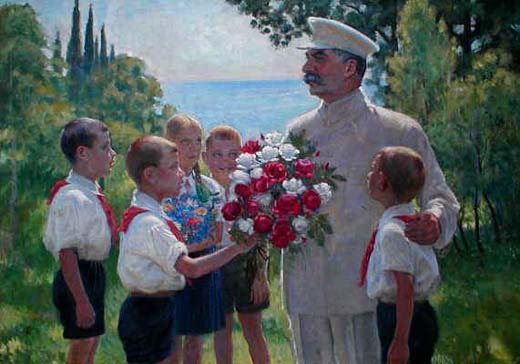 Stalin and Russian children (Observers France24/The Walls)
Stalin and Russian children (Observers France24/The Walls)
It was not always thus: under Stalin and Khrushchev the anti-fascist victory was downplayed. However, under Brezhnev, on the twentieth anniversary of the defeat of Nazi Germany, ‘Victory Day’ 9 May 1965, a veritable ‘cult of the Great Patriotic War’ was unleashed that eclipsed the October 1917 Revolution as the foundational myth of the Soviet state. Henceforth, ‘Victory Day’ holiday was bestowed with a sacred significance embracing both state and society. As economic growth slowed towards the end of the 1960s and consumer shortages grew, Brezhnev’s party-state resorted to an increasing celebration of ‘The Victory’ to bolster the sagging legitimacy of party and state. In the mid-1980s Gorbachev’s Perestroika began with high hopes for the renewal and reinvigoration of the Soviet system, in good part by lifting the lid on its Stalinist past; it ended with its downfall. A crucial ingredient in its fall in 1991 was the tarnishing of the ‘bronzed saga’ of the Great Patriotic War.[11]
The demise of the Soviet Union and its Communist Party left a vacuum of social identity and political purpose, particularly in 1990s Russia as it endured the travail of its transformation into a despotic, criminalised capitalism; resurrection of the cult of the Great Patriotic War, together with Russian Orthodoxy, proved an ideal way to fill the vacuum. Ironically, in post-Soviet Russia the myth of the war assumed even greater significance than it had in the Soviet Union. The titanic victory over Nazism stood out as the one bright spot in the otherwise seemingly bleak historical landscape of 20th century Russian history under Stalinist repression.
On the very eve of Putin’s accession to the Russian presidency in 2000 he had declared that ‘patriotism’ would be injected into post-Soviet Russia’s ‘ideological vacuum’ to bolster Russian ‘statehood’. The Great Patriotic War would be a central patriotic pillar of the ‘Russian idea’. Celebration of the 60th jubilee of the ‘Victory’ in 2005 was central to Putin’s drive to reinvigorate Russian patriotism. Extravagant Victory Day celebrations were intended to reassert the central role Soviet Russia played in the defeat of Nazism and to repudiate NATO expansion eastwards. Concomitantly, the Russian state has actively contributed to collective memory of Stalin’s triumphal war at the expense of collective memory of Stalinist repression. This desire to forge a usable past is seen in the establishment in May 2009 of the ‘Commission to Counter Attempts to Falsify History at the Expense of Russian Interests’.[12]
‘Great Patriotic War’ mythology has assumed particular intensity since the February 2014 crisis in Ukraine, with the ousting of elected president Yanukovich condemned as a ‘fascist coup’ and Russian annexation of Crimea described as ‘the third defence of Sevastopol’.[13] Putin’s popularity has risen exponentially on the back of his stance on Ukraine and NATO. Few Russians question Putin’s annexation of Crimea or the Patriotic War. Those that do can pay a heavy price. A new law in June 2014 enabled anyone who denigrated Russia’s record in World War II to be targeted. In March 2016, the veteran director of Russia’s main state archive, Sergei Mironenko, was dismissed after almost a quarter-century of service for doing just that.[14]
Israel: The Holocaust
While the sacralisation of history in the interests of state has proceeded apace in Russia and Australia, it pales in comparison with the extraordinary hegemonic power of the ‘The Holocaust’ in relation to Israel. So awesome has the Holocaust narrative become that, up until recent times, few would criticise even Israel’s most blatant violations of human rights and international law – from the 1948 Deir Yassin massacre to the current siege of Gaza – for fear of being accused of ‘anti-Semitism’, (if you are a gentile) or even of being a ‘self-hating Jew’. The Holocaust is the ultimate historical taboo; in 14 European nations the taboo is backed by laws against ‘Holocaust denial’.
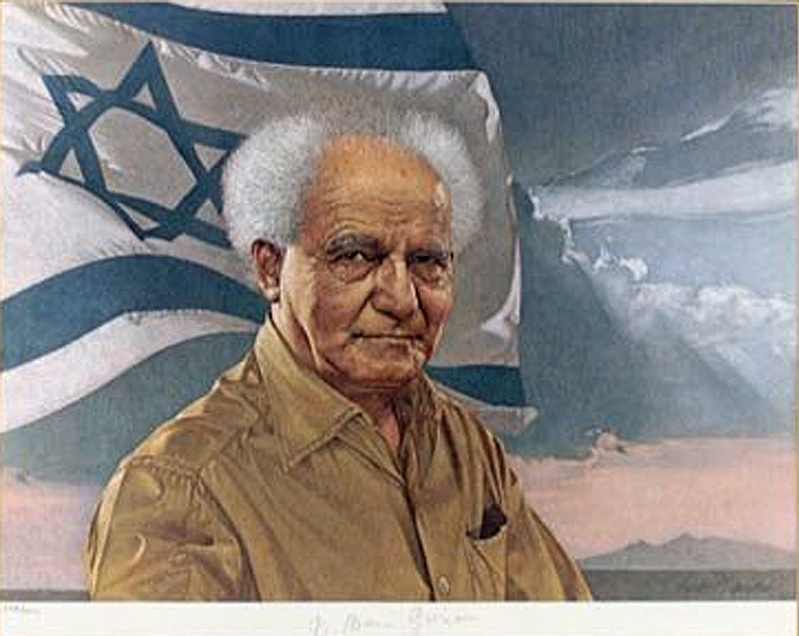 David Ben Gurion (Palestine Poster Project/Sde Boker)
David Ben Gurion (Palestine Poster Project/Sde Boker)
The issue here, of course, is not the indisputable fact of the Holocaust, but its representation and manipulation. In the case of Israel, the circumstances of its birth, in the wake of the catastrophic Nazi ‘Judeocide’ (Arno Mayer), and the fraught nature of the Zionist colonial-settler state enterprise in the modern era, have ignited the most explosive collision of experiences and public memory, one hegemonic, the other subaltern: the Jewish ‘Holocaust’ versus the Palestinian ‘Nakba’ (catastrophe).[15]
Instructively, the very term ‘Holocaust’ has its own history. ‘The Shoah’, Hebrew for ‘the Disaster’, as the Holocaust was initially called, was rarely invoked by Zionists as justification for the partition of Palestine and the 1948 proclamation of Israel. For the first decade of Israel’s existence, Israel’s first prime minister, the ‘fighting Zionist’, David Ben Gurion, preferred to forget rather than remember the Holocaust: ‘The one monument worthy of the memory of European Jewry … is the state of Israel’, he wrote in 1951.
Yet it was Ben Gurion who resurrected Holocaust memory by orchestrating the kidnapping and trial of Adolf Eichmann in 1960 as a ‘symbol of Israel’s asserted sovereignty and power’, directed in the first instance against Egypt’s emergent Nasserite nationalism. The Eichmann trial, in Israeli historian Idith Zertal’s words, ‘renewed national unity through memory … by mobilizing the utter political power of the Holocaust’. The ‘spectacle’ of the trial ‘swept through Israel’s language and images’, unleashing a discursive shift.[16] ‘“Never again” became the watchword of Jewish consciousness’[17] and the term ‘The Holocaust’ began to displace the Hebrew ‘Shoah’ when referring to Jewish genocide.[18]
So entrenched was the Holocaust narrative that, according to Israeli revisionist ‘new historian’ in exile, Ilan Pappe, it was not until the 1990s that ‘Post-Zionist’ academic historians really challenged it and the ‘1948 foundational mythology’. Access to archives exposed three explosive issues: 1. Zionist collaboration with Nazism; 2. attitudes towards Holocaust survivor immigrants to Palestine; and 3. the nature of the ghetto uprisings.[19] Under pressure, however, some of the leading ‘new historians’ retreated to what Pappe calls ‘neo-Zionism’. Most notable of these was Benny Morris, who in 2004 justified the 1948 ‘executions’ and massacres’ as ‘small war crimes’. In the case of Holocaust memory, the call for a ‘universalist’ approach to ‘modern genocide’ was abandoned.[20]
Conclusion: national narratives in a volatile age
There is an irony about these three examples of state-sponsored ‘sacralisation’ of ‘collective memory’ of the past: the more time that elapses since the actual historical events, the more intense public memory and remembering becomes. Specific factors are undoubtedly at work in each case: Israel’s pivotal role in the Middle East and its on-going war against the Palestinians; Russia’s quest for post-Soviet identity legitimating a neo-authoritarian, capitalist state, arisen from the ashes of Stalinist state socialism; Australia’s need to stifle Indigenous history and justify military interventions abroad. At the same time, the three nations seem to share a common concern to shore up nation-state stability in an unstable global environment.
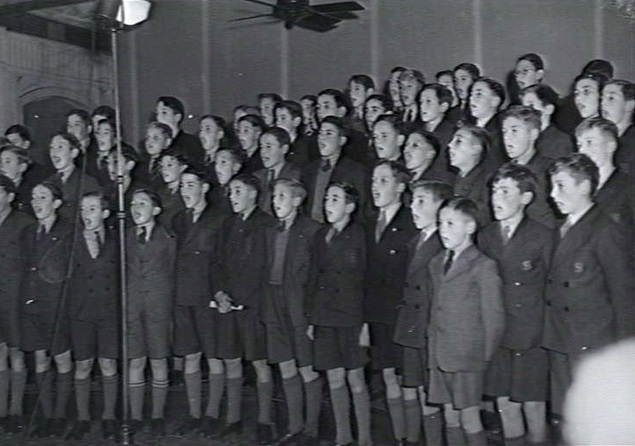 Boys choir, ABC 3LO studio, children’s Anzac service, 1943 (AWM 138689)
Boys choir, ABC 3LO studio, children’s Anzac service, 1943 (AWM 138689)
The modern state deliberately seeks to construct an unassailable, hegemonic, national narrative as a means of legitimation that masks and reinforces the coercive power of the state. Symbolic, cultural power, secured through written histories, rituals, films, commemorations, monuments, museums, and other ‘lieux de memoire’ (Pierre Nora), becomes a powerful instrument for shaping the past in order to secure the present and the future. Symbolic power becomes especially effective when history is sacralised to the degree that it becomes taboo or even blasphemous to challenge it, especially when historical trauma is at stake. Genocide cannot be taken lightly. Historical revisionism becomes fraught; self-censorship is a particularly powerful constraint on critique. But no historical question should be immune from critical, evidence-based, analysis; the lifeblood of historical scholarship. Revisionism is risky but state-sanctioned narratives left unchallenged can be dangerous, especially in our volatile, increasingly authoritarian, age.
* Roger D. Markwick is Professor of Modern European History, University of Newcastle, Australia. He is a specialist in modern Russian and Soviet history and historiography, with other interests in European fascism, genocide, and colonial settler states.
NOTES
[1] https://www.dva.gov.au/commemorations-memorials-and-war-graves/anniversaries-and-commemorative-events/Anzac-day-history (last viewed 17 March 2017).
[2] https://www.smh.com.au/national/ww1/sbs-presenter-scott-mcintyre-sacked-over-inappropriate-Anzac-day-tweets-20150426-1mtbx8.html (last viewed 17 March 2017).
[3] Marilyn Lake & Henry Reynolds, What’s Wrong With Anzac? The Militarisation of Australian History, NewSouth, Sydney, 2010.
[4] Mark McKenna, ‘Anzac Day: how did it become Australia’s national day?’ What’s Wrong With Anzac? p. 112.
[5] McKenna, ‘Anzac Day’, Ch. 5, esp. pp. 122-25.
[6] McKenna, ‘Anzac Day’, p. 124.
[7] Marilyn Lake, ‘How do school children learn about the spirit of Anzac?’ What’s Wrong With Anzac?, Ch. 6, passim.
[8] McKenna, ‘Anzac Day’, p. 133
[9] Lake, ‘Introduction: what have you done for your country?’ What’s Wrong With Anzac? pp. 1, 23.
[10] Roger D. Markwick, ‘The Great Patriotic War in Soviet and post-Soviet collective memory’, The Oxford Handbook of Postwar European History, Oxford University Press, Oxford, 2012, pp. 692-713.
[11] Nina Tumarkin, The Living and the Dead: The Rise and Fall of the Cult of World War II in Russia, Basic Books, New York, 1994, pp. 188, 190, 193.
[12] Although disbanded in 2013, the Commission focused on countering the historical grievances of Russia’s neighbours, e.g. the famine in Ukraine in 1932-33 and the massacre of Polish officers in Katyn in 1940. ‘Against falsification, and a changing of the guard’, Kritika: Explorations in Russian and Eurasian History, 10 (4), 2009 (New Series), pp. 747-51; David Brandenberger, ‘Promotion of a usable past: official efforts to rewrite Russo-Soviet history, 2000-2014’, in Vladimir Tismaneau and Bogdan C. Iacob (eds.), Remembrance, History, and Justice: Coming to Terms with Traumatic Pasts in Democratic Societies, CEU Press, Budapest & New York, 2015, pp. 200-205.
[13] Paul Wiseman, ‘Putin plays the patriotic card’, WWII Today, 29 (3), Sept/Oct 2014, pp. 10-12.
[14] Tom Balmforth, ‘Russian archive chief out after debunking Soviet WWII legend’, Radio Free Europe/Radio Liberty, 17 March 2016, <https://www.rferl.org/content/mironenko-state-archive-chief-removed-from-post-panfilov-legend/27619460.html> ; Katie Engelhart, ‘Vladimir Putin cracks down on historians and Ukraine invasion critics’, Maclean’s, 3 June 2014, <https://www.macleans.ca/politics/worldpolitics/vladimir-putin-cracks-down-on-historians-and-ukraine-invasion-critics/> (both last viewed 17 March 2017); Idith Zertal, ‘From the People’s Hall to the Wailing Wall: a study in memory, fear, and war’, Representations, 69, Special Issue: Grounds for Remembering, Winter, 2000, pp. 100-103.
[15] Ilan Pappe, The Ethnic Cleansing of Palestine, One World, Oxford, 2006, p. xvii.
[16] Ibid., pp. 104-107.
[17] Edward W. Said, ‘Invention, memory and place’, Critical Inquiry, 26 (2), Winter 2000, p. 188.
[18] E.g. in Yad Vashem academic publications: Jon Petrie, ‘The secular word HOLOCAUST: scholarly myths, history, and 20th century meanings’, Journal of Genocide Research, 2 (1), 2010, pp. 39-40.
[19] Ilan Pappe, The Idea of Israel: A History of Power and Knowledge, Verso, London, 2014, pp. 153-54, 158-59. ‘Post-Zionist’ revisionist scholarship produced such works as Tom Segev, The Seventh Million: Israelis and the Holocaust, also released as a documentary film in 1995, and Idith Zertal, Israel’s Holocaust and the Politics of Nationhood , Cambridge University Press, Cambridge, 2005.
[20] Pappe, The Idea of Israel, p. 168; ET Ottman, ‘A question of historiography: the “new historians” of Israel’, Ritsumeikan Annual Review of International Studies, 7, 2008, pp. 55-67, here p.62.


Yep. There is material on this in chapter 9 of the Honest History Book
It find the high poetic language that appeared after the First World War to be interesting. The dead became “the fallen”, and they paid “the supreme sacrifice”. Kipling’s brief line for war cemeteries was “their name liveth for evermore”. It is all highly evocative of noble knights and seeks to disguise the gross and disgusting deaths and injuries experienced by so many. There is nothing noble or knightly about being on the receiving end of a WWI artillery barrage.